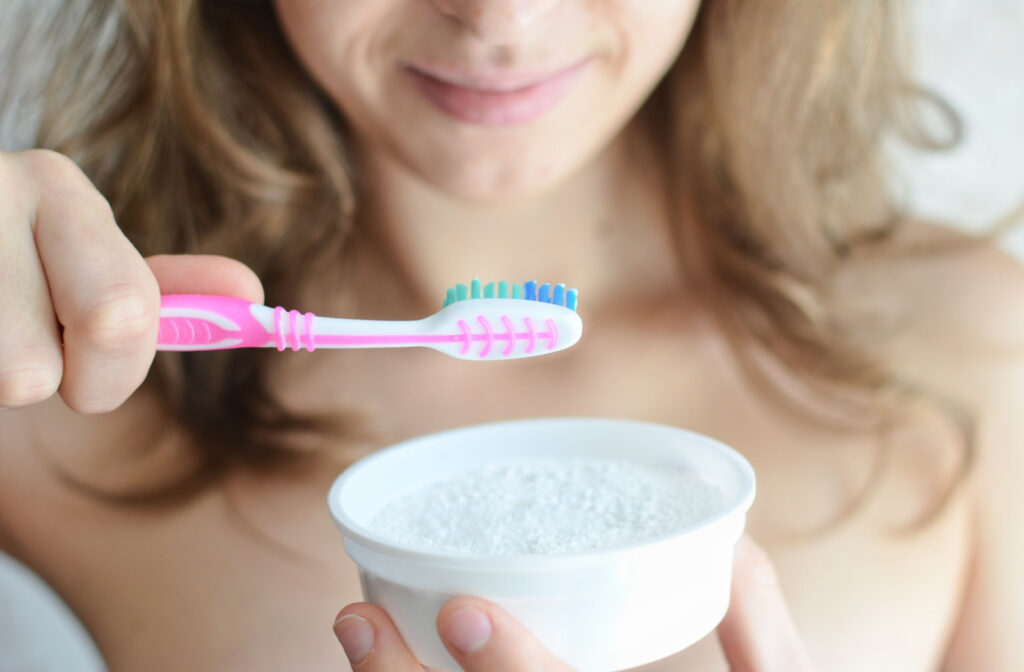A bright, white smile is something that many people desire, and while in-office whitening treatments can give you an aesthetically pleasing smile, many people wonder about the possibility of at-home solutions for teeth whitening, including baking soda.
Baking soda, regarded as a mild abrasive, can remove surface or superficial stains on teeth but is generally less effective than professional whitening. Baking soda can also damage your enamel over time, leaving you more susceptible to cavities.
For any kind of teeth whitening, it’s important to visit your dentist for a dental exam before you get started. We can assess the health of your teeth and help you decide whether teeth whitening is right for you—and which type of teeth whitening can help.
About Baking Soda
Baking soda, also known as sodium bicarbonate, has a variety of purposes, including being a natural cleaning agent and deodorizer. Baking soda is also a mild abrasive that can help remove surface stains from teeth.
The gritty texture of baking soda can aid in scrubbing away extrinsic discolouration (surface stains) caused by various factors, such as coffee, tea, tomato-based sauces, and red wine. However, it’s important to note that baking soda cannot change the natural colour of your teeth or remove stains under the surface of your teeth.
Pros of Using Baking Soda for Teeth Whitening
There are several pros to using baking soda as a teeth whitener, including:
- Affordability: Baking soda can be an inexpensive alternative to commercial teeth-whitening products, making it a potential budget-friendly option for those looking to brighten their smile without breaking the bank.
- Readily available: One of the most significant advantages of using baking soda is its widespread availability. It’s usually not hard to find, and many people already keep baking soda in their homes.
- Mild whitening: Baking soda can help remove surface stains, providing a mild and gradual teeth-whitening effect.
Cons of Using Baking Soda for Teeth Whitening
While you can find many dental products with baking soda as an ingredient, including toothpaste, using just baking soda and water as a paste can have possible negative side effects too.
Enamel Sensitivity
Baking soda is a mild abrasive, so excessive or continuous use or vigorous brushing with baking soda can damage your enamel and result in enamel sensitivity. It’s crucial to use it in moderation to avoid damaging the protective outer layer of your teeth.
Limited Effect on Deep Stains
Baking soda primarily addresses surface stains on your teeth. It may not be as effective for deep stains caused by factors such as genetics, health conditions, or certain medications.
Lack of Fluoride
Many commercial toothpastes contain fluoride, but baking soda typically lacks this essential mineral. Fluoride helps make teeth stronger and is crucial for preventing tooth decay. Using baking soda and water solely as toothpaste may compromise your oral health in the long run, as it doesn’t contain fluoride to help prevent cavities.
It’s important to discuss teeth whitening with your dentist before incorporating unconventional methods into your oral care routine, such as adding baking soda.
Teeth Whitening Methods
There are generally several types of teeth whitening available, including:
- Whitening toothpaste: Unlike regular toothpaste, whitening toothpaste has mild abrasives that can gently remove stains while you brush your teeth.
- Whitening mouthwash: Whitening mouthwash may include hydrogen peroxide or other whitening ingredients.
- Whitening gum: Whitening gum contains ingredients that can coat your teeth to prevent staining.
- Whitening strips: You can apply these strips to your teeth for a limited amount of time each day to help improve the appearance of your smile.
- Whitening trays: We can provide at-home kits with custom whitening trays moulded to your mouth. These trays use gel-based whitening solutions to help you achieve your desired results.
In-Office Whitening Treatments
While at-home whitening kits can brighten teeth, they often take a few weeks to work. In-office teeth whitening can typically offer a quicker experience for getting a brighter smile.
Professional teeth whitening also helps protect your lips, gums, and the insides of your cheeks from bleaching solutions or harsh whitening ingredients.
Compared to commercially available products on store shelves, in-office whitening treatments also usually have higher concentrations of whitening ingredients for better and longer-lasting results.
How to Prevent Tooth Stains
There are several types of tooth stains, including extrinsic, intrinsic, and age-related staining. There’s not much you can do to prevent age-related tooth staining beyond brushing and flossing regularly—however, you can avoid the following foods and drinks to prevent extrinsic and intrinsic staining:
- Red wine
- Tea
- Coffee
- Cola
- Berries
- Tobacco
Personal Solutions for Bright, Healthy Teeth
Baking soda may be a well-known home remedy for teeth whitening, but it can also be a double-edged sword—effective for removing stains but potentially harmful if used regularly.
Baking soda is also not a substitute for regular dental care. Going for regular dental checkups, brushing your teeth twice a day, flossing, and avoiding foods and drinks that can stain your teeth are essential dental hygiene practices.
As with any dental concern, you can book an appointment with Shawnessy Dental Centre to discuss the right approach for supporting your oral health and achieving your desired smile with teeth whitening.


